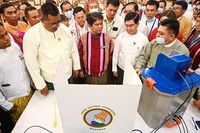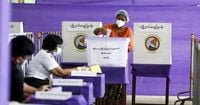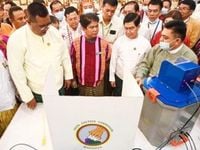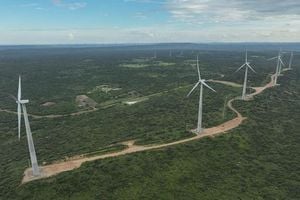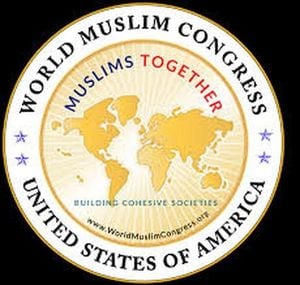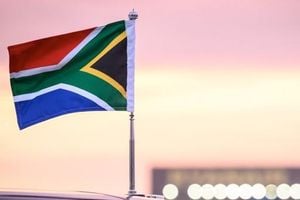Myanmar is set to embark on a national election beginning December 28, 2025, even as the country remains deeply fractured by a relentless civil war and widespread skepticism from both domestic and international observers. The announcement, made on August 18 by the military-backed Union Election Commission, marks the first attempt at a nationwide vote since the 2021 coup that ousted the democratically elected government of Aung San Suu Kyi. Yet, with the military government controlling less than half of Myanmar and vast territories held by pro-democracy resistance fighters and ethnic minority rebels, the prospects for a truly national—and credible—election remain murky at best.
The election, according to the commission, will be conducted in multiple phases, with the full schedule to be released in coming weeks. All of Myanmar’s 330 townships have been designated as constituencies, and nearly 60 parties—including the military-backed Union Solidarity and Development Party—have registered to run. While the commission touts this as a multiparty democratic process, critics, including international monitors, have denounced the planned poll as a charade designed to legitimize continued military rule. As one citizen in Rakhine state told Agence France-Presse, “I think this election is only being held to give power to military dictators until the world ends.”
The backdrop to this election is a nation consumed by conflict since the military, led by Min Aung Hlaing, seized power in February 2021. The generals justified their takeover by alleging massive fraud in the 2020 election—a claim widely dismissed as unsubstantiated by both domestic and international observers. The result was a groundswell of popular opposition that quickly escalated into armed resistance, plunging Myanmar into a civil war that has killed thousands, left more than half the population in poverty, and displaced over 3.5 million people. According to Reuters and the Associated Press, nearly 40 percent of those displaced are children.
Since the coup, the military government has enacted increasingly draconian measures to maintain control. Last month, a new election law was passed, carrying the potential death penalty for anyone who opposes or disrupts the elections. Most of the leaders from Aung San Suu Kyi’s dissolved National League for Democracy (NLD) party have been arrested, including Suu Kyi herself, who is serving a 27-year prison sentence after a series of politically tainted convictions. According to AP, the NLD had won a landslide victory in the 2020 election, but the military intervened before the party could begin its second term.
The junta’s grip on power, however, remains tenuous. Large swathes of the country are administered by a patchwork of pro-democracy guerrillas and powerful ethnic armed organizations, many of whom have pledged to block the polls in their territories. The military government, for its part, has responded with a campaign of airstrikes and ground offensives aimed at retaking opposition-held areas. Civilian casualties have mounted in recent months, with at least 24 deaths reported from the bombing of a hospital in Mawchi, Kayah state, on August 17. The provisional government formed by resistance groups put the toll even higher, stating that 32 civilians were killed, five were injured, and several remain missing. Just days earlier, on August 14, an airstrike on Mogok, the country’s gem-mining center, killed at least 21 people. The military rarely acknowledges these attacks, typically insisting it only targets legitimate enemies of the state and labeling resistance fighters as terrorists.
Despite these grim realities, the junta has persisted in its narrative that the upcoming election will pave the way toward peace and stability. To this end, the regime has offered cash rewards to opposition fighters willing to lay down their arms ahead of the vote. Yet many opposition lawmakers, ousted by the coup, are boycotting the process entirely. A United Nations expert has branded the vote a “fraud” designed to rebrand continuing military rule.
The logistical challenges to holding a nationwide vote are immense. A census conducted in 2024 as part of the election’s preparations failed to collect data from 19 million of Myanmar’s estimated 51 million people, citing “significant security constraints.” This shortfall underscores just how limited the reach of the election may be, given the ongoing violence and the government’s lack of control in many areas.
Junta chief Min Aung Hlaing, currently serving as both acting president and commander-in-chief of the armed forces, is widely expected to maintain his grip on power regardless of the election’s outcome. Analysts suggest that the vote may serve more to consolidate his authority—whether as president, military leader, or through a newly created office—than to usher in any genuine democratic transition. “Analysts say the election will likely see Min Aung Hlaing maintain his power over any new government,” reports Digital Journal.
Meanwhile, the prospect of elections has exposed rifts within the already fractious opposition. Some groups are weighing whether to participate, while others have vowed to disrupt the process altogether. According to AFP, “the vote may cause further splits in an already fractious array of opposition groups as they weigh whether to participate in the poll.”
International observers remain deeply skeptical. The lack of free media, the imprisonment of opposition leaders, and the ongoing violence have led many to dismiss the elections as little more than a façade. “International monitors have criticized the poll as a charade,” notes Tribune. U.N. reports have also detailed torture and other abuses inflicted on those detained by the military.
In the weeks leading up to the vote, junta leaders have called for increased security to protect politicians and voters, warning of a rise in attacks on civil servants. Yet, for many in Myanmar, the sense of hope that once accompanied the promise of democracy has been replaced by cynicism and fear. “I don’t think the election will hold any significance for the people,” a 63-year-old citizen from Rakhine state told AFP.
As the December 28 start date draws closer, the world will be watching Myanmar with a mix of concern and skepticism. With the country still wracked by violence, millions displaced, and the most prominent voices for democracy silenced or imprisoned, the coming election seems unlikely to deliver the legitimacy or peace the military claims it will bring. Instead, for many, it stands as a stark reminder of the deep divisions and ongoing struggles that continue to shape Myanmar’s future.
